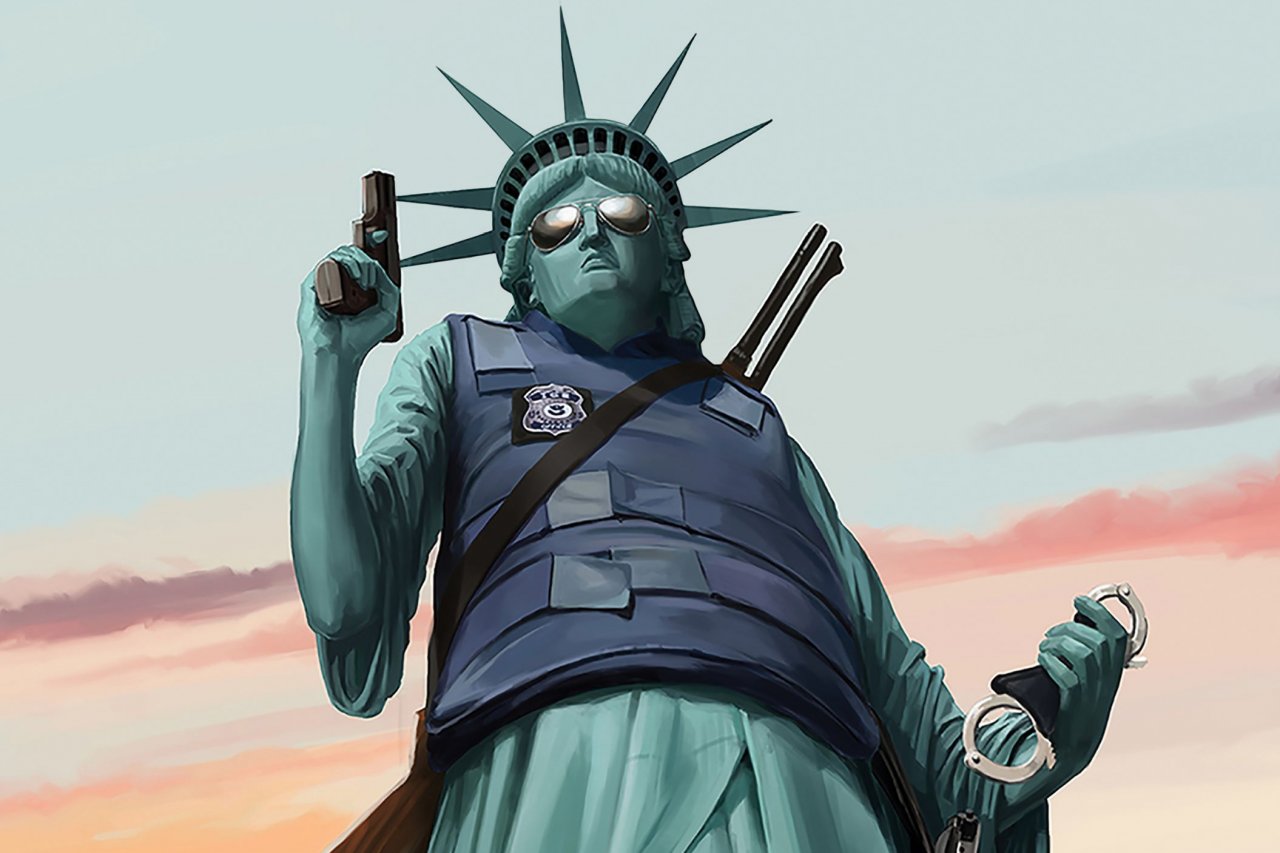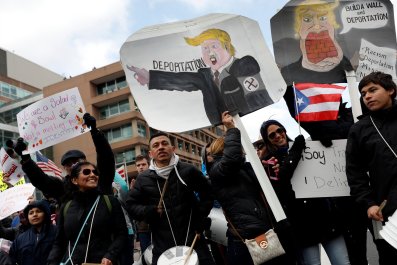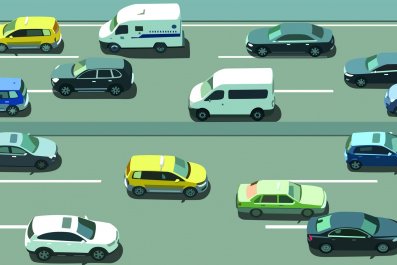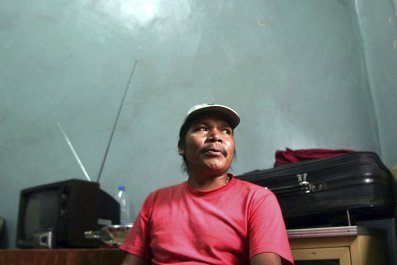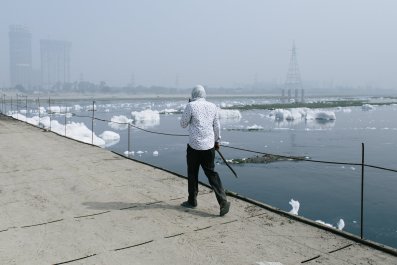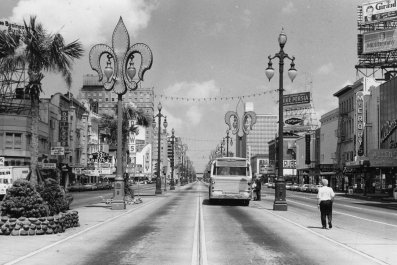It was a moment of great joy, and then fear. Ammi Arevalo found out she was pregnant in early February, not long after President Donald Trump signed two executive orders ramping up enforcement of immigration law and deportations. Her first reaction was happiness, mixed with some low-level financial anxiety, but almost immediately a dark foreboding took over her thoughts. As an undocumented immigrant, Arevalo already dreads an early morning knock on her door from immigration agents. That's why she's now researching midwives and plans to give birth in her apartment, just like a friend who recently had her baby boy at home for the same reason. "I'm just trying to hide from ICE, because the moment I go to the hospital they are going to ask for my name," Arevalo says, crying softly into her green tea on the patio of a Starbucks in West Houston. "With the new laws that Trump signed, I'm afraid I'm going to get arrested."
Arevalo left El Salvador 14 years ago, fleeing an abusive family member and one of the highest murder rates in the world, and floated across the Rio Grande with a coyote when she was 16. She was picked up by U.S. Border Patrol just after she crossed into America near the small town of Roma, Texas, and released with instructions to report to immigration court. Then she joined her mother and little brother in Houston. She never went to court. Now the 30-year-old runs a small café, waking at 4 a.m. each morning to make sandwiches and tostadas alongside her three employees (one has documents, two do not). Arevalo married a U.S. citizen and carefully pays her taxes. She cherishes Lone Star institutions like Whataburger and her local NFL team, the Houston Texans. She smiles brightly when she reveals she has a small crush on their star defensive end J.J. Watt.
But since Trump was elected in November, she lives in constant fear of that knock on her door. She knows U.S. Immigration and Customs Enforcement has her name from when she was picked up at the border, and she assumes she has a deportation order because she didn't appear at immigration court over a decade ago. Arevalo's marriage provides no protection—undocumented immigrants don't magically become legal when they marry a U.S. citizen.
And so she lives in the shadows as much as possible. She shops online, uses Uber when she has to deliver food to white neighborhoods and never opens her blinds at home so she can more easily hide if immigration agents come looking for her. The day before we spoke, she was scrolling through Facebook when she saw a news story about the deportation of an undocumented El Salvadoran man who had lived in Houston for 16 years. "He came here when he was 15 or 16," she says. "It's almost my case."
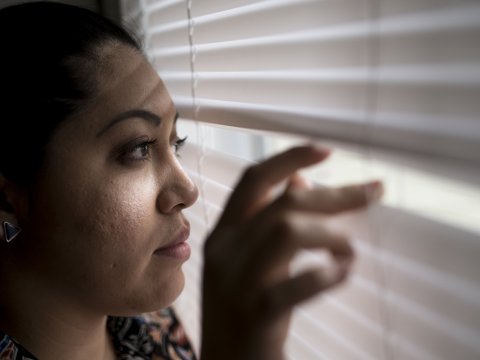
His deportation scared her so much that she nervously ate a large bag of spicy Cheetos that day. "I'm hopeful that this is a bad moment we are going through, and the president will open his eyes and see that we are not criminals," she says, looking down at the Coach purse she bought at an outlet mall. "I would say, 'Mr. Trump, My name is Ammi. I'm not a criminal. I'm just a young woman who's looking for an opportunity.'"
The War Starts Here
Arevalo and 11 million like her are at the center of a long-running fight that is sparking regular protests and threatening to go nuclear in the early days of the Trump presidency. Leading one side of the war are organizations advocating for undocumented immigrants and even teaching tactics to avoid and subvert immigration laws. They want people like Arevalo to live in the U.S. with no real legal distinction between them and American citizens. Leading the other side are the president, many politicians and sheriffs in Texas, and organizations pushing for tighter enforcement and millions of deportations.
Both forces are powerful and both are using political strategies and street-level tactics to push their agenda. Texas is a major battlefield in the fight, thanks to its southern border, its politics and the ingrown independence and irascibility of the people who live there.
There are 6 million people spread throughout Houston and its sprawling suburbs dotted with dollar stores and taco trucks, shiny office towers built with oil money, fancy coffee shops with market-price cold brew and parking lots brimming with BMWs. Also living and working in the county are almost 400,000 undocumented immigrants, according to the Migration Policy Institute. Head south on Route 59—the border is 350 miles away—and the city quickly gives way to open fields, roadside stands selling pecans and honey, and gas stations that will process your hog or whitetail deer into jerky for $50. There are few good estimates for the number of undocumented immigrants in the rural Texas counties between Houston and the border, but the prevailing sentiment there is that stricter enforcement and mass deportations would be good for the region and for the United States. "I was in the masonry business for 12 years, and they made it pretty hard for me to make money," Justin Pack, a wiry road worker in a Batman T-shirt, says of undocumented immigrants. Leaning on a white truck on a stretch of highway where motorists often spit chewing tobacco in the gas station urinals, Pack welcomes much tougher enforcement against the undocumented. "They need to leave the country."
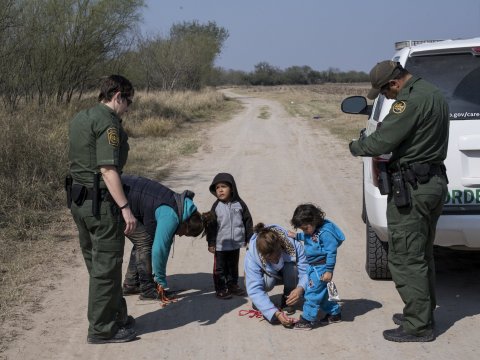
The Fatal Funnel
The wind is whistling across the corn and cotton fields as Sheriff A.J. "Andy" Louderback loads his Colt .45 at the Jackson County shooting range off Route 59, just past the herd of goats grazing next to the county dump. Louderback is the legislative director for the Sheriffs' Association of Texas, and he says local law enforcement leaders must follow the laws as written when it comes to the border and illegal immigration. To him, that means enforcing federal immigration law and honoring detainers from ICE when the federal agency asks the locals to hold a prisoner for them. Honoring detainers is a subject of intense national debate, with cities like New York City, Los Angeles and Austin refusing to do it. "I don't want this country to be like other countries that are lawless," says Louderback, citing South America as an example as he slides cartridges into a clip.
In late February, the Department of Homeland Security released two memos that laid out President Trump's plans for undocumented immigrants, including the construction of a border wall, more expedited deportations and the hiring of thousands of Border Patrol agents. (Even if hiring requirements are lowered to speed up the process, it will take five years and $2.2 billion to meet Trump's quota, Foreign Policy reported.) One section in the memos focused on the expansion of a federal program that deputizes local law enforcement to enforce federal immigration law.
Louderback has already been approved for that program, and over a dozen other sheriffs in his region have submitted their applications to DHS. The program, known as Section 287(g), gives locals access to federal databases so they can check names, fingerprints and photos and also gives the locals the authority to interrogate suspects about their immigration status, charge people with immigration violations and transport them to an ICE-approved detention facility.
Louderback and the sheriffs from neighboring counties say they have no interest in enforcing federal immigration laws on the street, and their 287(g) applications will have them enforce immigration laws only in their jails on people they have arrested. But joining the 287(g) program, along with their support for Trump, makes them allies in the push for increased enforcement and deportation. More checking of immigration status by more layers of law enforcement and the increased powers granted by 287(g) will mean more people detained and deported. "We need to keep a closer eye on who we have living here," says Refugio County Sheriff Raul "Pinky" Gonzales, who likes the increased enforcement laid out in the DHS memos.
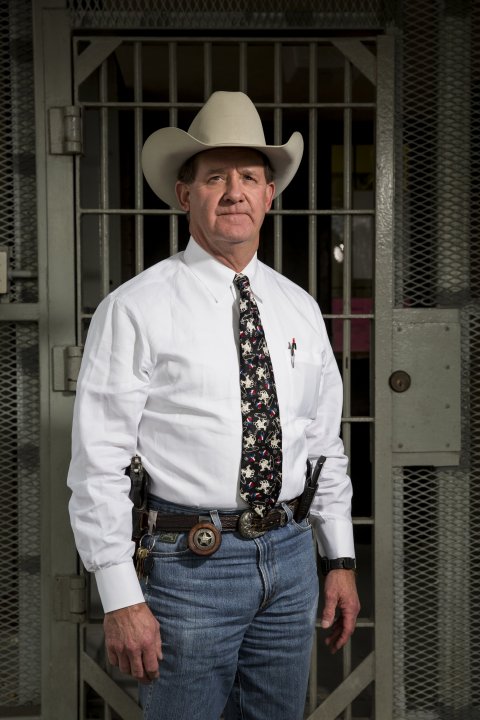
Gonzales raises another complaint common in Refugio, named for the Our Lady of Refuge Spanish mission built there in 1791: Undocumented immigrants don't pay taxes and scam social services and welfare. "They're taking advantage of the system, and we're paying for it. We hear about it," he says, gesturing with a hand scarred from the time an alligator he had lassoed got loose and bit him. "'Hey, I just saw a person here at [the grocery store] paying with a Lone Star [food stamps] card, and she got in a dang Cadillac and drove off!'" (According to the U.S. Chamber of Commerce, undocumented immigrants paid $1.5 billion in taxes in Texas in 2013 and aren't eligible for federal benefits like Social Security or food stamps.)
Sheriffs in the region also say they face a constant stream of traffickers moving drugs, guns and people north from the border—leaving them with the responsibility to enforce the law with little federal assistance. "Immigration and border security is broke, and it's been broke for a long time," says Victoria County Sheriff T. Michael O'Connor, whom Texas Monthly called a multimillionaire heir to a family fortune in cattle, oil and land that stretches back five generations. His office is decorated with Texas A&M posters, as well as a dozen glass bongs seized from a drug bust, some of them shaped like dragons and mushrooms.
O'Connor calls the corridor from the border to Houston the "Fatal Funnel," and when asked the reason for the grim name, he answers heartily. "Death! Death! Unwarranted death. And we have to deal with them. We have to find families," says O'Connor, recalling the terrible 2003 day when 19 men, women and children killed by the heat were found trapped in a tractor trailer on the outskirts of Victoria. "We have a pauper's grave site where we have to bury individuals because we never could get any of the consulates in Houston and beyond to help identify."
Leaning on his truck tailgate after his time on the shooting range, Louderback lays out his support for strict enforcement, like the detention of undocumented immigrants swept up when ICE targets an undocumented criminal (known as "collaterals") and the deportation of undocumented parents. He is especially scornful of sheriffs who ignore federal detainers. "We have some in law enforcement doing that, encouraging and promoting lawlessness."
Criminalizing Parenting
The Queens offices of immigrant rights group Make the Road New York were thrumming on a recent morning. The waiting room was packed with members ready to ride a bus to Elizabeth, New Jersey, to protest outside an ICE detention center, a large classroom was full with two dozen adults learning English and the back room held small children eating bagels. Natalia Aristizabal, a lead organizer with a faded stripe of green in her hair who was born in Colombia and came to the U.S. without documents when she was 12, walks in at 9 a.m. and immediately starts herding members and organizers onto a yellow school bus.
Once the bus is on the road, she has time to talk. "Immigrants feel attacked in a way we haven't before," she says. Aristizabal, who was able to obtain a green card and her U.S. citizenship, uses the Spanish words "mas incendiario" to describe the heightened rhetoric used by those calling for increased enforcement and deportations. (One woman on the bus, wary of who might be watching, signed her name on the sign-in sheet as, "Julia X.") "The protest is to highlight this war that people are fighting."
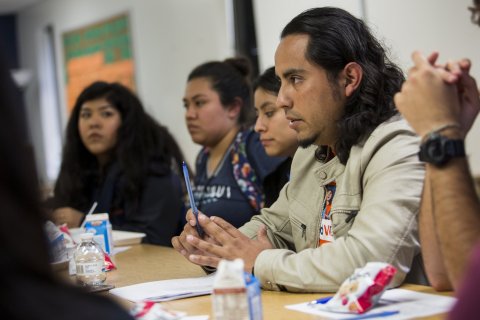
As the bus passes Yankee Stadium in the Bronx, Aristizabal walks up and down the bouncing aisle to make sure everyone has the phone number and access code for a conference call that will explain the DHS memos, released two days earlier. Listening intently are riders on this and other Make the Road buses and vans driving to the protest from Brooklyn, Staten Island and Long Island. "There's also language about prosecuting people who have quote-unquote smuggled people into the U.S.," a Make the Road lawyer says on the call, pausing so Aristizabal can translate her words into Spanish. "And of particular concern is how that would apply to parents who brought their children into the U.S.," the lawyer adds, raising the concern that parents could be prosecuted for bringing their undocumented kids into the country. After Aristizabal translates, the lawyer also notes that many of the measures are unfunded. "A lot of this memo is extremely scary and worrisome, but it's important to keep in mind that it will require a lot of funding from Congress."
The bus pulls up outside what was once a cement warehouse but is now a 300-bed ICE detention center run by CoreCivic, which recently changed its name from Corrections Corporation of America and has seen its stock soar 140 percent since election night. The facility's big glass windows line the street, projecting an impression of light and openness, but a few inches behind the glass are thick concrete blocks bricked over the opening. "They think they can make money out of black and brown bodies," says Aristizabal.
Aristizabal's path to citizenship—an illegal entry, followed by a slow path to legal status—highlights the contradictions inherent in a common complaint against illegal immigration: "I'm fine with immigration. But they have to do it legally!" In fact, unless a hopeful immigrant has a master's degree in computer science, it's almost impossible to legally move to the United States. Immigration permissions based on employment, family connections or humanitarian reasons have tight requirements and numerical restrictions—making many hopeful immigrants ineligible to "get in line," according to the pro-immigration nonprofit American Immigration Council.
A U.S. State Department representative tells Newsweek the backlog for legal immigration is just over 4.5 million people. New visas will be limited to 366,000 for applicants with family or employment preferences, so it would take over 12 years for everyone who has already applied to legally immigrate. (There were also 315,000 visas given out in 2016 to people with immediate relatives who are U.S. citizens.) And the wait for those visas is often much longer, even for people who are eligible to get in line because they are lucky enough to have a U.S. citizen in their family tree. Children of U.S. citizens from Mexico can wait over 20 years for a visa, and Filipino siblings of U.S. citizens wait about 25 years, according to AIC.
The Make the Road New York members clamber off their busses and gather between metal barricades and the detention center as more protesters arrive from Make the Road offices in New Jersey, Connecticut and Pennsylvania, as well as the Service Employees International Union and local progressive organizations. "God bless 'em," says a policeman as he monitors the protesters. Standing next to his department-issue Harley-Davidson, he says Elizabeth has always acted as basically a sanctuary city. "It's gotten a little shaky because the city doesn't really want to cooperate with ICE," he says, illustrating the vast gulf in attitudes and approach toward illegal immigration between different local law enforcement agencies.
The protest grows to maybe 150 people, and there are speeches in which speakers bash local politicians for failing to protect people from deportation. Then, in a piece of carefully choreographed political theater, five protesters sit down to block the center's entrance in front of a large black banner that reads, "No more deportations." Aristizabal kneels down to straighten the banner as news photographers and videographers record the scene. A policeman approaches and tells them they are obstructing traffic, the protesters remain seated, and in less than a minute more policemen swoop in to gently handcuff and arrest them.
An undocumented Mexican named Simon who works as a mechanic during the day and at a deli in the evening tells me he used his one day off to come to this protest. "Everyone is scared," he says, standing next to the type of detention center that would imprison him if he gets caught. "They're scared of ICE police coming and arresting the parents, and then what happens to their kids? All people [are] scared for their kids."
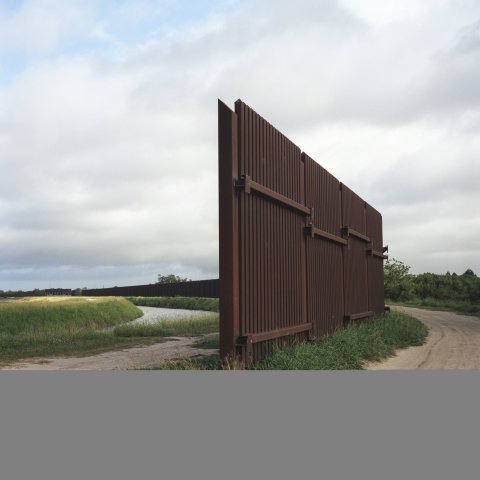
'They're Killing Americans'
Sam Herrera, the outreach director for Stop the Magnet, an anti–illegal immigration organization in Houston, answers his apartment door sipping a cold bottle of Topo Chico mineral water. The Hispanic insurance agent compares his city's large undocumented population to a cancer and says the problem requires an equally dramatic cure. "You go to the doctor, and the doctor says, 'Hey, you know, you're going to have to take chemo radiation to cure this cancer.' Well, no one wants to hear that news. But it's a necessary step to be cured. There's no chemo-lite." Herrera smiles. "If you're not a citizen of this country, you're not entitled to anything. You're entitled to a nice trip home if you like," says the Navy veteran.
Texas Republicans are pushing a bill, known by the shorthand of SB4, that would cut funding from cities that ignore ICE detainers and even make a failure to enforce federal immigration laws a criminal and civil offense. Trump also said in an executive order that cities that don't comply with federal immigration laws would not receive federal funds. Texas Governor Greg Abbott blocked funding to Austin in early February after the sheriff there said her city would no longer honor federal immigration detainers. Asked why he made the bill one of his legislative priorities, Lieutenant Governor Dan Patrick tells Newsweek: "From June of 2011 to January of this year, we booked over 212,000 criminal aliens in our Texas jails. They committed 1,143 murders, nearly 500 kidnappings, 6,001 sexual assaults."
While pro-immigration groups maintain that undocumented immigrants commit crimes at a lower rate than native-born citizens, Patrick insists that doesn't matter. "They've killed 1,000 people in the last four years. Those people shouldn't have died," he says, adding that he thinks the real number of undocumented immigrants in the U.S. is likely 20 million. (The Migration Policy Institute estimates it at 11 million.) "It's a revolving door right now—we catch 'em, we deport 'em, and they're back 24 hours after we deport them. And they're killing Americans."
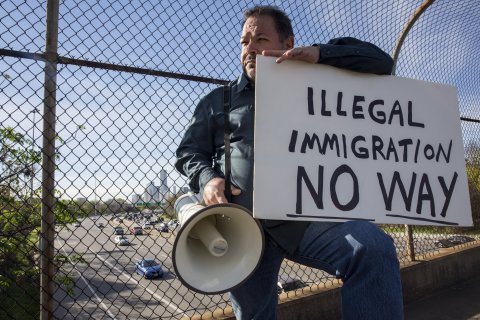
This alleged crime wave is a focus of conservative Texas politicians, the president and national organizations like the Remembrance Project, which displays on its website photos of children killed by "illegal aliens." The national director of that organization, Maria Espinoza, stood behind Trump in the Oval Office when he signed his executive orders on illegal immigration in late January. When Trump gave a joint address to Congress on February 28, he introduced four people who had children or husbands killed by undocumented immigrants. "These brave men were viciously gunned down by an illegal immigrant with a criminal record and two prior deportations," Trump said, introducing the widows of two murdered California cops. "Should have never been in our country." He then announced the creation of a new DHS office to be called VOICE, which will help the victims of crimes committed by undocumented immigrants.
Standing in his one-bedroom apartment near a rosary hanging from a lamp and a painting left over from his divorce, Herrera lays out how he explains illegal immigration to his critics: "How would you feel if later tonight some random stranger comes into your house—and by the way, he's going to be sleeping in your daughter's room. How would you feel about that?... The daughter in this case is my country. And whatever happens in that room is damaging my country. You're damaging your daughter."
'We're All Screwed'
Back in Houston, organizers at the immigrant rights group United We Dream, which works with Make the Road and has 55 affiliates in 26 states and over 100,000 members, are teaching undocumented people to prepare for detention or deportation by notarizing a document that gives some parental rights to a family member or friend so that person can care for their children, pick them up from school and get them medical care. "If you have a child in your hands, they don't care," says UWD organizer Adonias Arevalo of ICE agents, speaking in the group's Houston offices. Wearing braces and a stylish H&M T-shirt, Arevalo says the number of parents clamoring for help preparing such documents has spiked since Trump's election.
The group expanded its "Deportation Defense" education and tactics, which includes orange "Know Your Rights" cards printed in Arabic, Chinese, Korean, Spanish and English, across Texas since November. Undocumented people, mostly women, are also banding together in groups of about 10 to pool money in a local credit union so they have a reserve fund—if members are detained or deported, the group can pay their bond, help their family weather the loss in income or help them return to the U.S.
Arevalo—the younger brother of Ammi Arevalo—crossed the Rio Grande riding on a yellow float when he was 12 with his mother and a coyote. He later qualified for an Obama policy, known as the Deferred Action for Childhood Arrivals, or DACA, that postponed deportation for undocumented immigrants who came to the U.S. as minors, but DACA has not provided any defense against detention and deportation since Trump took office.

A 22-year-old aspiring math professor, Daniela Vargas, was arrested in Mississippi in early March immediately after she spoke at a press conference for undocumented migrant rights. ICE planned to deport Vargas even though she had applied for the renewal of her DACA status and was awaiting its approval. Arevalo recently checked his file online and found a deportation order has been issued against him. "Under the new administration," he says, "we're all screwed."
Karla Perez, an immigrant rights organizer—and an undocumented immigrant—sits at a table in the UWD headquarters in Houston. A soft-spoken law student in her second year at the University of Houston, Perez suddenly speaks loudly when asked whether she thinks Trump's orders and the Texas bill known as SB4 are motivated by racism. "Oh yeah! These are racially based bills," says Perez, whose husband proposed to her in these offices. "People are uncomfortable with people who look like me being in their communities. We're perceived as a threat, as a danger, simply because of the color of our skin, because of what we look like."
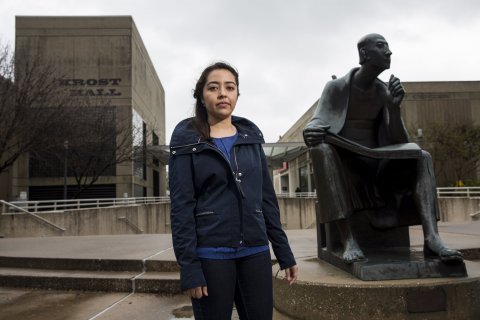
Get Ready for $10 Tomatoes
Robert Rutt retired from ICE five years ago, but when he pulls up at a fancy Houston coffee shop he still embodies the stereotypical image of the agency: a big white guy in a large American-made SUV. "When I'm talking to colleagues, active and retired, there's a feeling and spirit of being unleashed and unshackled to do their jobs and enforce the laws on the books," says Rutt, who ran ICE's Homeland Security Investigations (HSI) unit in Houston until 2012.
Under the new orders, the ICE officers who do enforcement and removal operations (ERO officers) and encounter undocumented immigrants while targeting an undocumented criminal or someone with a deportation order can now detain those people as well. "In the past administration, the policy was they were not allowed to pick up collaterals unless they had prior approval," says Rutt, who oversaw investigations including migrant smuggling and human trafficking during his time at HSI. He adds that ERO officers formed into fugitive operations teams prioritize violent criminals but also work to arrest people with final orders of deportation (like Adonias Arevalo). "They're expected to bring in X amounts of fugitives per month, per quarter," he says.
But locking up more people costs money. The U.S. Congress gives ICE a budget for the detention of 34,000 people a day, but the average daily population for fiscal year 2017 is 41,047, an ICE official says. And ICE is projecting the higher number of detainees will cause a $600 million shortfall in its budget this year, forcing it to redirect funds from HSI again, according to a document a former DHS official gave Newsweek. (ICE also ransacked HSI's budget last year to give $34.5 million to ERO to pay for detention beds, which meant HSI couldn't replace armored vehicles overseas, bulletproof vests or first-aid kits, the document states.) Rutt says HSI should be split off from ICE to become a standalone agency because of the negative stigma attached to ICE. "The rhetoric of sweeps, locking people up, that impacts HSI's ability to work with state and local law enforcement partners," he says.
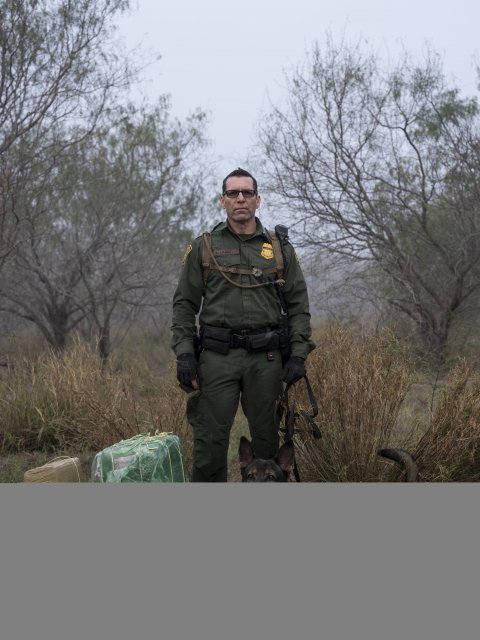
Rutt empathizes with undocumented immigrants fleeing their home countries to come to the United States. He knows about the high crime rates in El Salvador, Belize and Honduras and the lack of a stable middle class in Mexico, but he argues the U.S. needs to aggressively enforce its federal immigration laws. "Can you imagine you're living in Honduras, and your daughter turns 13, and the gangbangers are hitting on her and wanting her to become their concubine?" he says. "It's like, 'Fuck, I'm getting my kid out of here. I love my kids. I'm bringing them to the states.'" Rutt also notes how much undocumented immigrants contribute to Social Security without receiving any benefits ($15 billion a year, according to CNNMoney), the impossibility of deporting all of them and the importance of their work to the U.S. economy. "The American people are not ready to pay $10 for a tomato."
But even with those caveats, he welcomes tougher enforcement. He compares undocumented immigrants to people who rob a bank to feed their family—you still have to arrest the bank robbers. "We're a nation of laws. We have to enforce that law."
'Don't Open the Door!'
As the Make the Road bus makes its way back to Queens, Aristizabal hands out ham sandwiches as youth organizer Luba Cortes lays out the specific tactics Make the Road is using to protect undocumented immigrants and foil ICE. Since Trump was elected, Cortes has been teaching "Know Your Rights" forums at local public high schools and colleges, where she runs through a PowerPoint presentation. (Make the Road also holds "Know Your Rights" forums for adults.) "We do role-playing, like if you're somewhere and you get detained by ICE, what do you do?" says Cortes, who has two nose rings and came to the U.S. without documents from Mexico when she was 5 years old but now has a green card.
At the forums, Make the Road organizers tell undocumented people to not open the door for ICE agents unless they have a warrant signed by a judge. Organizers tell the story of a New Jersey woman saved from ICE agents who had come to her business to arrest her, but the woman's daughter refused to open the door for them. Don't say anything to immigration authorities except your name. Carry identification but not your passport from your home country—that would make it easier for authorities to deport you. "If they have a warrant, let them break down the door and come in," says Cortes, who grew up tagging along with her undocumented mother to housekeeping jobs.
Cortes also advises people to set up small networks of about five people on the messaging program WhatsApp, which uses end-to-end encryption and is more secure than regular texting, so they can quickly contact one another when there is ICE activity in their neighborhood. ("Latinx people love WhatsApp," Cortes says, using the gender neutral word for Latino.) Each network also connects to others and some connect to organizers like Cortes and Aristizabal so that leaders and people can quickly exchange information about ICE operations, though the organizers have become more paranoid about surveillance and now use an even more secure app called Signal.
Make the Road also instructs people to film ICE operations and detentions so the footage can be given to defense lawyers in hopes of bolstering the arrestee's case. "It's the same thing as cop-watching, but it's ICE-watching or Migra-watching," says Cortes. She also encourages people to shelter their undocumented friends or neighbors if they know ICE is targeting them. "You can open up your home for them so they can be protected," she says. Asked if she would compare that tactic to the underground railroads used by slaves to escape into free states, she agrees.
"Trump inherited this system of violence, and it's only going to get worse," she says, fanning out the singles and jingling the quarters she has collected from the other riders as a tip for the bus driver. "We need to continue these trainings because we don't know what's going to happen next. It's very clear that we need to be ready and be militant."



